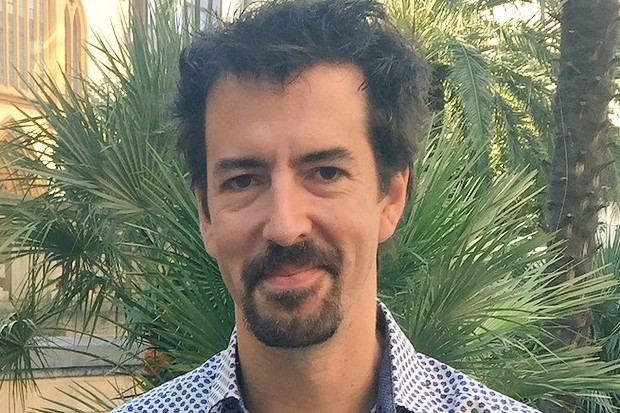Félix Viscarret • Director
“The documentary was a tug of war between two pig-headed people”
- SAN SEBASTIÁN 2017: From a place of deep admiration, Félix Viscarret sketches a portrait of his filmmaking mentor in Saura(s), through interviews with his children and third wife

Saura(s) [+see also:
film review
trailer
interview: Félix Viscarret
film profile] is the second documentary in the series Cineastas contados. First up was Virginia García del Pino with La décima carta [+see also:
film review
trailer
film profile], born out of her admiration for the recently departed Basilio Martín Patino. Now it’s Félix Viscarret’s turn to bring us his unique way of approaching the director of Mama turns 100, Sevillanas and The 7th Day, in a documentary screening in the Zabaltegi-Tabakalera section of the 65th San Sebastián International Film Festival.
Cineuropa: In the documentary Saura(s) we see the teacher put his pupil in his place...
Félix Viscarret: Yes, that’s why it’s so much fun. It’s a real lesson in adapting to the knocks and unforeseen events of life, and making the most of that friction. Film theorists tell us that without conflict, there can be no drama and no narrative. I was anxious to show something of the inner life of Carlos Saura, and worried about what would happen if he wouldn’t allow me access to those mysteries. Suddenly I realised that this anxiety of mine was part of the film, part of a cinematic portrait by a director from another generation (me), longing to be inducted into the secrets of the master. The fact that it was sometimes impossible to break through his defences is part of the documentary.
But in the end, Saura ends up treating you like another son…
He says that our films are our babies, and that the directors who have learned from his films are also in a sense like his adoptive children. In the end, he treated me like an eighth son, an adoptive son at least, throughout this whole experience. On the one hand, he was resistant to opening certain doors to his past, doors that I needed to knock on, and on the other he invited me in, breaking the fourth wall and addressing me directly during the conversations with his children. I found that duality quite amusing — not wanting to reveal hidden aspects of his past while at the same time making constant efforts to include me.
He seems a bit like an absent father, who welcomes you nonetheless.
That’s a really nice thing to say, because one of the crucial things about this film is that nothing is black and white. All of his children feel great affection, love and a sense of solidarity, of family, of belonging to this clan, this patriarch, despite all the generational differences between the older members and the youngest and despite the fact that they are the product of different marriages or relationships — even though he’s a master who keeps going because he’s so obsessively devoted to his creations, and so nothing in their lives is that straightforward.
What’s more, Saura seems to have instilled in them a passion for creativity, because they all work in film or other creative arts.
That’s right; that’s why I wanted to portray, not just the master himself, but his family as well, because it seemed to me so emblematic and intergenerational. They are all involved somehow in the audiovisual industry — it’s really quite interesting.
What made you decide to appear on-screen yourself?
My initial plan was the complete opposite: I wanted to be strict and for it to be a conversation solely between him and his children. But sometimes that’s a mistake: there’s no need to hold on to preconceived notions and Saura’s humour and the way he kept dropping in references to me taught me to take a risk and try something new. In the end, I realised that it was important to the film to show this struggle that I experienced in my eagerness to show him as he is. The situation dictated it: if I didn’t include that aspect, it would hamstring the portrayal. The tussle was part of this journey — this tug of war between two pig-headed people.
(Translated from Spanish)
Did you enjoy reading this article? Please subscribe to our newsletter to receive more stories like this directly in your inbox.
















